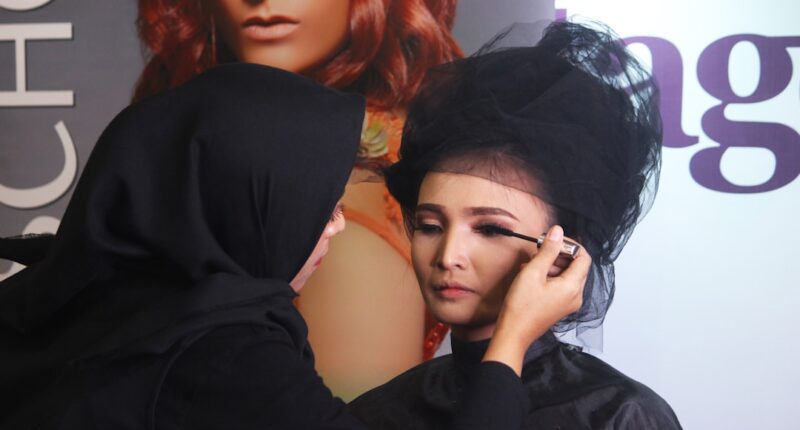In recent years, the phenomenon of social media influencers has transcended borders, with Russia emerging as a significant player in this global trend. The rise of Russian influencers can be attributed to several factors, including the rapid growth of internet access and the proliferation of social media platforms within the country. As more Russians gained access to high-speed internet and smartphones, the digital landscape became fertile ground for individuals to cultivate their personal brands.
This shift has allowed a diverse array of voices to emerge, from fashion and beauty gurus to travel enthusiasts and tech reviewers, each carving out their niche in the vast online ecosystem. The cultural richness and unique perspectives of Russian influencers have not only captivated local audiences but have also begun to attract international attention. Moreover, the Russian influencer scene has been bolstered by a strong sense of community among content creators.
Many influencers collaborate with one another, sharing audiences and resources, which amplifies their reach and impact. This collaborative spirit is evident in various social media campaigns and events that bring together influencers from different backgrounds and specialties. As a result, Russian influencers have developed a distinctive style that resonates with their followers, often blending traditional Russian culture with contemporary trends.
This fusion has enabled them to create content that is both relatable and aspirational, further solidifying their status in the digital realm. The rise of these influencers marks a significant shift in how brands engage with consumers, as they increasingly turn to these digital personalities to promote their products and services.
Key Takeaways
- Russian influencers are gaining popularity and influence on global social media platforms.
- They are changing the digital marketing landscape by offering unique content and style.
- The most popular Russian influencers are active on platforms like Instagram, YouTube, and TikTok.
- Russian influencers face challenges and opportunities in the global market, but they are shaping digital trends.
- The future of Russian influencers in the digital world looks promising as they continue to impact global social media.
The Impact of Russian Influencers on Global Social Media
The influence of Russian content creators extends far beyond their national borders, significantly impacting global social media dynamics. As they gain popularity, these influencers are reshaping the way brands approach marketing strategies, particularly in the realm of influencer partnerships. Their unique perspectives and cultural insights provide brands with an opportunity to connect with diverse audiences in innovative ways.
By collaborating with Russian influencers, companies can tap into new markets and engage consumers who may have previously been overlooked. This cross-cultural exchange not only enriches the global social media landscape but also fosters a greater understanding of different cultures and lifestyles. Furthermore, Russian influencers are adept at leveraging various platforms to maximize their reach and engagement.
From Instagram and TikTok to YouTube and VKontakte, they utilize a multitude of channels to share their content and connect with followers. This multi-platform approach allows them to experiment with different formats and styles, catering to the preferences of their diverse audience. As they continue to gain traction on these platforms, Russian influencers are setting trends that resonate globally, influencing content creation practices and marketing strategies across industries.
Their ability to adapt to changing social media landscapes ensures that they remain relevant and impactful, making them key players in the ongoing evolution of digital communication.
The Most Popular Russian Influencers and Their Platforms

Among the myriad of Russian influencers, several stand out due to their substantial followings and unique content offerings. One such figure is Ksenia Sobchak, a prominent television personality and socialite who has successfully transitioned into the digital space. With millions of followers on Instagram, Sobchak uses her platform to discuss various topics ranging from politics to lifestyle, often sparking conversations that resonate with her audience.
Her ability to blend entertainment with social commentary has made her a significant voice in both traditional media and the influencer sphere. Similarly, other influencers like Alena Shishkova and Daria Shapovalova have garnered massive followings by focusing on fashion and beauty, showcasing their personal styles while collaborating with renowned brands. In addition to these established figures, emerging influencers are also making waves in the digital landscape.
For instance, popular YouTube channels like “Like Nastya,” featuring a young girl engaging in playful activities, have captured the hearts of millions of viewers not just in Russia but around the world. This channel exemplifies how family-friendly content can transcend cultural barriers and appeal to a global audience. Platforms like TikTok have also seen a surge in Russian creators who leverage short-form video content to entertain and engage viewers.
These influencers often participate in viral challenges or create comedic skits that resonate with younger audiences, further solidifying their place in the ever-evolving world of social media.
How Russian Influencers are Changing the Digital Marketing Landscape
| Metrics | Data |
|---|---|
| Number of Russian influencers | Over 100,000 |
| Engagement rate | Average of 5% |
| Preferred social media platforms | Instagram, YouTube, VKontakte |
| Types of content | Beauty, fashion, travel, lifestyle |
| Impact on digital marketing | Increasing brand awareness and driving sales |
The emergence of Russian influencers is fundamentally altering the digital marketing landscape by introducing new strategies for brand engagement. Traditional advertising methods are increasingly being replaced by influencer partnerships that prioritize authenticity and relatability. Brands are recognizing that consumers are more likely to trust recommendations from individuals they follow online rather than conventional advertisements.
This shift has prompted companies to invest heavily in influencer marketing campaigns that leverage the unique voices and personalities of Russian content creators. By aligning themselves with influencers who share their values and aesthetics, brands can create more meaningful connections with their target audiences. Moreover, Russian influencers are pioneering innovative approaches to content creation that challenge conventional marketing norms.
They often employ storytelling techniques that resonate deeply with their followers, weaving personal narratives into brand promotions. This method not only enhances engagement but also fosters a sense of community among followers who feel connected to the influencer’s journey. As a result, brands are increasingly adopting these storytelling strategies in their marketing efforts, recognizing that emotional connections drive consumer loyalty.
The impact of Russian influencers on digital marketing is profound; they are not merely promoting products but are reshaping how brands communicate with consumers in an increasingly crowded marketplace.
The Unique Style and Content of Russian Influencers
One of the defining characteristics of Russian influencers is their unique style and content that often reflects a blend of cultural heritage and modern trends. Many influencers draw inspiration from traditional Russian art, fashion, and literature while infusing contemporary aesthetics into their work. This fusion creates a distinctive visual language that sets them apart from their global counterparts.
For instance, fashion influencers may showcase traditional garments alongside modern streetwear, creating a dialogue between past and present that resonates with both local and international audiences. This ability to merge different cultural elements allows them to create content that is not only visually appealing but also rich in meaning. In addition to their aesthetic choices, Russian influencers often tackle a wide range of topics that reflect the complexities of contemporary life in Russia.
From discussions about mental health and body positivity to explorations of social issues such as gender equality and environmental sustainability, these influencers use their platforms to raise awareness and spark conversations. Their willingness to address challenging subjects resonates with followers who seek authenticity and relatability in the content they consume. By sharing personal stories and insights, Russian influencers foster a sense of connection with their audience, encouraging dialogue around important issues while simultaneously entertaining them.
The Challenges and Opportunities for Russian Influencers in the Global Market

While the rise of Russian influencers presents numerous opportunities for growth and engagement on a global scale, it also comes with its fair share of challenges. One significant hurdle is navigating cultural differences when attempting to appeal to international audiences. What resonates with a domestic audience may not necessarily translate well abroad, requiring influencers to adapt their content while remaining true to their roots.
This balancing act can be particularly challenging for those who wish to maintain authenticity while expanding their reach beyond Russia’s borders. Additionally, language barriers can pose obstacles for influencers seeking to connect with non-Russian-speaking audiences, necessitating creative solutions such as subtitles or translations. Despite these challenges, there are ample opportunities for Russian influencers to thrive in the global market.
As interest in diverse voices continues to grow within the digital space, brands are increasingly seeking out influencers from different cultural backgrounds to enhance their marketing strategies. This trend presents an opportunity for Russian content creators to showcase their unique perspectives while collaborating with international brands looking to diversify their influencer partnerships. Furthermore, as social media platforms evolve and new technologies emerge, Russian influencers can leverage these advancements to create innovative content that captures the attention of global audiences.
The Role of Russian Influencers in Shaping Digital Trends
Russian influencers play a pivotal role in shaping digital trends not only within their own country but also on a global scale. Their ability to set trends is often rooted in their keen understanding of audience preferences and emerging technologies. For instance, many Russian influencers were early adopters of platforms like TikTok, utilizing its short-form video format to create engaging content that resonates with younger audiences.
By embracing new technologies before they become mainstream, these influencers position themselves as trendsetters within the digital landscape, influencing how others create and consume content. Moreover, the collaborative nature of the influencer community in Russia fosters an environment where trends can quickly gain traction. Influencers often participate in challenges or campaigns that encourage creativity and innovation, leading to viral moments that capture widespread attention.
This collaborative spirit not only amplifies individual voices but also contributes to a collective identity within the influencer community. As trends emerge from this dynamic ecosystem, they often ripple outwards, influencing content creation practices across various platforms worldwide.
The Future of Russian Influencers in the Digital World
Looking ahead, the future of Russian influencers in the digital world appears promising yet complex. As social media continues to evolve, these content creators will need to adapt to changing algorithms, audience preferences, and emerging technologies. The rise of artificial intelligence and virtual reality presents both challenges and opportunities for influencers seeking to engage their followers in new ways.
For instance, incorporating augmented reality features into content could enhance user experiences while providing fresh avenues for creativity. Additionally, as platforms become more saturated with content creators vying for attention, standing out will require innovative approaches that prioritize authenticity and connection. Furthermore, as global interest in diverse voices continues to grow, Russian influencers have an opportunity to expand their reach beyond traditional markets.
By embracing collaborations with international brands and engaging with audiences across different cultures, they can carve out a unique space within the global influencer landscape. However, this expansion must be approached thoughtfully; maintaining authenticity while navigating cultural nuances will be crucial for long-term success. Ultimately, the future of Russian influencers will depend on their ability to adapt to an ever-changing digital environment while remaining true to their unique identities and perspectives.









